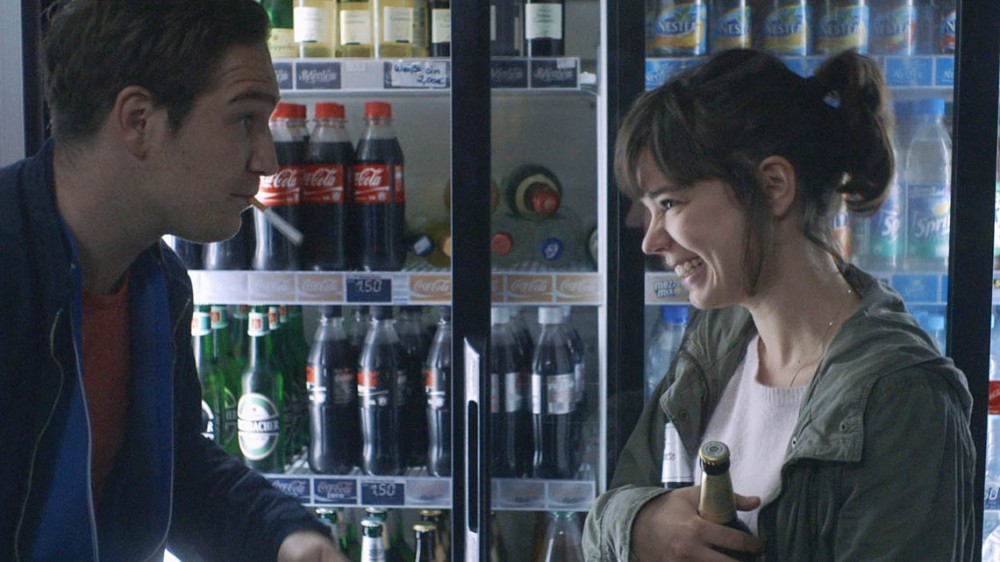FIVE STARS
Sebastian Schipper’s Victoria is centred on two young twenty-somethings; the go-getting, exuberant Spanish girl Victoria (Laia Costa) and the local bruiser with swaggering charm Sonne (Frederick Lau). Their encounter begins under the lights of a subterranean techno club. Both are looking for something and seem to find it in each other. Over the course of one night we are invited to observe their burgeoning romance against the backdrop of a thriving, yet melancholic 4am West Berlin. Just as we are beginning to fall in love with this partnership, however, the film becomes less Before Sunrise (1995) and more Bonnie and Clyde (1967). Sonne and his friends are petty criminals and the second act of the film takes the shape of a heart-stopping heist-thriller, with Victoria dragged along as the unlikely sidekick.
The themes present show continuity with the rest of Schipper’s filmography. All of his films explore relationships between several people during a crisis. Often an external event or influence pushes these relationships to the brink of destruction and viewers are compelled to see how the characters will react, which is certainly the case for Victoria. Schipper first hit the international film scene with his 1999 debut, Gigantics. It follows the story of a boy who decides to break out of his hopeless home town and travel the world, much to the disappointment, envy and confusion of his two best friends. The film similarly tracks changes in their group dynamic over the course of one night (but it’s no high-school romp like American Graffiti). In Schipper’s A Friend of Mine (2006), a type A and type B are forced to work together in a car rental agency. Viewers observe the co-workers progression from hatred to unconventional love. Sometime in August (2009) explores the lives of a happily married couple taken to hell and back by the return of estranged relatives. It is clear, then, that Schipper seeks to deal with and negotiate the human condition, particularly when it involves the development of relationships. Human drama is Schipper’s bag.
Victoria’s immersive qualities are largely down to the rich characterisations of the two leads. With a script made up of a meagre twelve pages, it is testament to the abundant talent of these actors, whose unwavering ingenuity manages to create two convincing, flawed and astoundingly real protagonists, all through heavy improvisation. Before the film catapults its viewers into a chaotic second half, a scene in the coffee shop at the nights supposed end is the moment everyone becomes invested in these two individuals. Victoria’s coy, playful mask slips as she grieves the death of her dream to be a professional pianist. Sonne is clearly spellbound yet nonetheless anguished by her sadness. From this moment on, viewers have no choice but to see how this one plays out. Lau and Costa have us in the palm of their hands and they don’t release us until the closing credits.
However, there is one giant leap of faith that Schipper decided to take with Victoria. This separates the film not only from his previous work, but from most of cinematic history itself. It forced him to unlearn everything learnt at film-school and to shake off all conventional impulses as a filmmaker. Schipper’s vision for Victoria, one that took five years to cultivate, was to capture the entire film in one single take.
Rather than drawing from previous examples – like Hitchcock’s Rope or Iñárritu’s Birdman – Schipper does not fool his audience. Hitchcock, for instance, would use darkness to cross-cut scenes. Birdman also was similarly tricksy with its camera and Iñárritu’s flashy CGI is a world away from the gritty realism of Victoria. Schipper cuts no such corners. The result of this DIY ethos is a raw, white-knuckle ride leaving viewers wondering what the fuck just happened, in the best possible sense.
But by God, it wasn’t an easy feat to pull off. The whole two hours and ten minutes was filmed in real time by cinematographer Sturla Brandth Grøvlen, who is unusually, yet deservedly, the first name we see when the credits roll. Moving breathlessly across twenty locations, Grøvlen lugged five and a half kilos of camera equipment around the lamp-lit streets and dirty nightclubs of post-twilight West Berlin. He required weeks of back training and lifting to gather the stamina necessary for such a physically demanding challenge. Adding to this pressure was the fact that all of the cast and crew had only three chances at shooting the film using the long-take.
With so much at stake for everyone involved, it was inevitable that these anxieties would manifest somewhere in the filming process. Schipper has since commented on the unique, wild energy that characterised the set, telling The Guardian that he came at his crew with a ‘certain aggression’. This tension, the sense that everything could fall apart in a moment, is what allows the film to sustain such an electric momentum.
There are, however, points in the film where things feel a little muddled and some questions seem unresolved. Is this a suspense thriller about a heist or an arthouse exploration of young love? Why does Victoria keep making poor choices? What is Schipper really trying to say? Luckily, the dazzling craftsmanship of the cinematographer coupled with the effectiveness of the two leads means that it doesn’t really matter. Victoria is not perfect, and in an industry of big studios and even bigger budgets, its unapologetic messiness is half its charm. You readily overlook plot holes and plausibility to fully appreciate and immerse yourself in the sublime chaos.
This is more than a film; Victoria is a kinetic, almost transcendental journey through time and space, love and youth. And when the titular heroine wanders listlessly away from the fateful night, viewers also have to retreat back into their own reality… although it may take a while.



